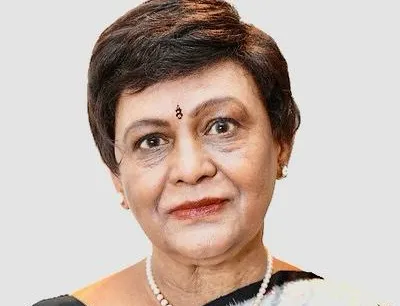Each woman's story is a building block for resilience and growth
Breaking barriers

Judge Mohini Moodley
Image: Supplied
From fighting apartheid to taking law outside of the courtrooms to make it more accessible, Judge Mohini Moodley's career is a masterclass in using law as a tool for community empowerment. Judge Moodley, who retired in July 2023 as Judge of the KwaZulu-Natal Division of the High Court, speaks on the challenge of looking beyond tokenism and "pioneer" status to focus on true equity.
JUDGE Mohini Moodley’s journey in law begins in apartheid South Africa. Hailing from a politically conscious community, she was drawn to law early on, engaging with anti-apartheid organisations and leaders. Rather than leave South Africa (like many activists were forced to), she made the deliberate choice to remain and use the legal system to fight apartheid.
Initially pursuing an English honours degree and working as an academic, she later transitioned to law due to disillusionment with her faculty. In the midst of law studies and raising her children, she forged a path that led her to become an attorney and later the director of the Practical Legal Training School. It was work outside of the courtroom that defined her career.
She decided to focus on community legal education, which included providing free legal advice, advocating for women's rights, and working to implement the Domestic Violence Act through workshops effectively. In these spaces where education was limited, she saw the impact of making the law accessible. Her decades of community service culminated in 2008 with her appointment to the high court, becoming the first female attorney to sit on the KwaZulu-Natal bench.
This historic breakthrough was made possible through intentional mentorship. She acknowledges Judge Shyam Gyanda, who invited her to serve as an assessor and acted as an "informal mentor," paving the way for her permanent appointment. Her rise serves as a powerful reminder of how allies in power can intentionally dismantle barriers for others.
Judge Moodley speaks passionately about the need for the stories of women who come after the "first" as essential for progress. She asserts that while pioneers must be celebrated, the real evidence of transformation is the visibility and success of those who follow. She describes the experiences of these women as critical to those who hear them, as they encourage them to do better. These stories, experiences and perspectives become crucial to ensuring the "ladder" is not cut away after the first.
“In South Africa, for example, there are many policies and laws that entrench equality. There are Constitutional imperatives for gender and representation. But when one examines this carefully, then one must ask, what is true equity? True equity requires not only that appointees possess the appropriate credentials but also that robust governance structures are in place to ensure compliance with equity policies,” said Judge Moodley.
She defines tokenism as appointments made merely for appearances, often to comply with policies to secure work or contracts. In these cases, the appointee is effectively a "puppet or a figurehead" with no role in governance or significant decision-making, which undermines the essence of equity. Further, these same power dynamics often push women toward specialising in certain areas of litigation that often put them at a financial disadvantage.
Fields like maritime law (in South Africa) are dominated by big corporations and male partners, with limited opportunities for women.
Judge Moodley asked: “I might study, I might write the exam, but what is the guarantee that I will actually get work?”
She emphasises a systematic shift from merely having policies to dismantling the entrenched "patriarchal institutional culture". This culture manifests in several ways: it fosters a toxic work environment that necessitates objective, transparent responses; it creates "work reservation", pushing women toward certain types of law (like family law) while protecting lucrative sectors (like maritime law) as the "exclusive domain" of male partners; and it prioritises "who you know, rather than what you know" in appointments, thereby limiting professional growth regardless of demonstrated competence.
Judge Moodley recommends a multi-pronged approach. Institutions must enforce sexual harassment policies with proper support for survivors, implement mandatory, universal training for all members regardless of hierarchy, and confront a toxic work environment head-on. Ultimately, she stresses, the greatest responsibility lies with women in leadership to "make space for women", ensuring that authority is genuinely shared and that policies and guidelines promoting equity are published and reflected at every organisational tier.
Now retired, Judge Moodley dedicates her time to empowerment projects. She has joined the Women in Leadership in Law (WILL) team. This current work is the continuation of her lifelong mission: "I continue to encourage and empower women in the profession, while I believe I’m also assisting to break down barriers and to achieve meaningful institutional change."
To young women beginning their journey in law, Judge Moodley urges them to "be passionate and committed" and not to "remain within the confines of your office and practice".
Instead, she emphasises the absolute need to "extend your work out of the office into the community you work in" to truly understand its needs and make a lasting impact.
This article has been published by Purpose, a social impact agency based in Nairobi, for a campaign called “Difference She Makes” which focuses on the everyday leadership of women in law who are transforming institutions, reimagining justice, and challenging exclusion.
Related Topics: